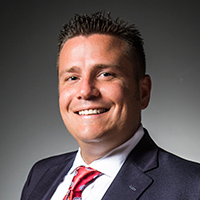Maximize Your Savings Opportunities With the Often-Overlooked HSA
These health savings tools can offer a triple tax advantage for some.


Profit and prosper with the best of Kiplinger's advice on investing, taxes, retirement, personal finance and much more. Delivered daily. Enter your email in the box and click Sign Me Up.
You are now subscribed
Your newsletter sign-up was successful
Want to add more newsletters?

Delivered daily
Kiplinger Today
Profit and prosper with the best of Kiplinger's advice on investing, taxes, retirement, personal finance and much more delivered daily. Smart money moves start here.

Sent five days a week
Kiplinger A Step Ahead
Get practical help to make better financial decisions in your everyday life, from spending to savings on top deals.

Delivered daily
Kiplinger Closing Bell
Get today's biggest financial and investing headlines delivered to your inbox every day the U.S. stock market is open.

Sent twice a week
Kiplinger Adviser Intel
Financial pros across the country share best practices and fresh tactics to preserve and grow your wealth.

Delivered weekly
Kiplinger Tax Tips
Trim your federal and state tax bills with practical tax-planning and tax-cutting strategies.

Sent twice a week
Kiplinger Retirement Tips
Your twice-a-week guide to planning and enjoying a financially secure and richly rewarding retirement

Sent bimonthly.
Kiplinger Adviser Angle
Insights for advisers, wealth managers and other financial professionals.

Sent twice a week
Kiplinger Investing Weekly
Your twice-a-week roundup of promising stocks, funds, companies and industries you should consider, ones you should avoid, and why.

Sent weekly for six weeks
Kiplinger Invest for Retirement
Your step-by-step six-part series on how to invest for retirement, from devising a successful strategy to exactly which investments to choose.
Here’s something nearly every financial professional who’s a retirement specialist wants you to know:
If you want to maximize the money in your portfolio, you can’t limit your focus to finding successful investments.
Of course you want to keep growing your money to and through your retirement years. But it’s also important to manage the risk factors that can eat away at your bottom line, from inflation and health care costs to taxes.
From just $107.88 $24.99 for Kiplinger Personal Finance
Become a smarter, better informed investor. Subscribe from just $107.88 $24.99, plus get up to 4 Special Issues

Sign up for Kiplinger’s Free Newsletters
Profit and prosper with the best of expert advice on investing, taxes, retirement, personal finance and more - straight to your e-mail.
Profit and prosper with the best of expert advice - straight to your e-mail.
The good news is there are many strategies that can help you deal with those risks, including ways to keep the IRS from taking more than its fair share of your nest egg. But with so many different rules governing whether contributions and earnings are taxable, tax-deferred or tax-free, it can be tough to compare and decide which investments will best serve your needs over the course of your lifetime.
Perhaps that’s why tax-favored health savings accounts (HSAs), which have been around since 2003, still don’t get much attention as an investment tool. Or maybe it’s because to open an HSA, you have to have a high-deductible health insurance plan. (To qualify in 2019, you must have a policy with a deductible of at least $1,350 for single coverage or $2,700 for family coverage.) There also has always been a bit of confusion regarding HSAs and flexible spending accounts (FSAs), which have many of the same benefits but also some “use it or lose it” time limitations.
Whatever the reason, it’s a shame HSAs are so often overlooked. Because unlike most investments, which might offer two tax benefits (such as tax-free contributions and tax deferral on growth, or tax-free growth and tax-free withdrawals), an HSA can be a triple threat. Here’s how:
- All of your contributions to an HSA are pre-tax, just like with a 401(k), and the contributions remain in your account until you use them. You can contribute to an employer-sponsored HSA plan through payroll deductions or, if you’re doing the HSA on your own, take the deduction when you file your income tax. Just as with a 401(k), there are limits to how much you can contribute each year. The maximum contribution for 2019 is $3,500 if you have single coverage, or up to $7,000 for a family. If you’re 55 or older, you can contribute an additional $1,000.
- Any growth in your HSA is tax-free, and you can choose how to invest the money in your account. You can play it safe and direct your funds to a relatively risk-free checking or money market account, but you also may be able to go with investments such as dividend-paying bonds, ETFs or mutual funds. These offer the potential for a higher rate of return, but you assume more risk and could lose some of your principal and interest.
- Withdrawals for qualified medical expenses are tax-free at any time. Here’s where the HSA offers unique benefits. If you take money from your account to pay for a medical expense (there’s a list of qualifying expenses at https://www.irs.gov/publications/p502), you don’t have to pay taxes on the withdrawal, no matter what age you are. Once you turn 65, if you have money in the account you haven’t used, you can withdraw it for any reason and pay ordinary taxes on it without a penalty. Or you can continue to use it tax-free to pay for medical costs. (You can’t contribute to an HSA once you’re enrolled in Medicare, but you can draw on funds already in the account.)
Is an HSA the right fit for you? If you’re a high earner and can’t contribute to a Roth IRA, an HSA is an appealing alternative for maximizing investment savings. But even if you have the Roth option, an HSA is another tax-efficient tool to consider — one that also can help you save for future health care costs.
How significant are those expenses in retirement? When Fidelity Investments did its 16th annual retiree health care cost estimate, it found that a 65-year-old couple retiring in 2018 would need $280,000 to cover health care and medical expenses throughout retirement. That was a 2% increase from 2017 and a 75% increase from Fidelity’s first estimate of $160,000 in 2002. And that doesn’t include the cost of long-term care.
As for taxes, no one knows what the tax system in America is going to look like down the road. But given our ever-growing national debt — which is currently over $22 trillion — many experts agree taxes in our country are likely to be higher in the future.
The average citizen can’t do much to control the outside factors that contribute to retirement risk. But you can take steps now to prepare for what’s ahead.
Talk to your financial adviser or tax attorney about what an HSA could mean for you. You also can find information at www.irs.gov/pub/irs-pdf/p969.pdf. Research the different options available, and make sure you’re getting what you need to maximize your hard-earned savings.
Kim Franke-Folstad contributed to this article.
The article and opinions in this publication are for general information only and are not intended to provide specific advice or recommendations for any individual. We suggest that you consult your accountant, tax, or legal adviser with regard to your individual situation.
Securities offered through Kalos Capital Inc. and Investment Advisory Services offered through Kalos Management Inc., both at 11525 Park Woods Circle, Alpharetta, GA 30005, (678) 356-1100. Retirement Income Strategies is not an affiliate or subsidiary of Kalos Capital Inc. or Kalos Management Inc.
The appearances in Kiplinger were obtained through a PR program. The columnist received assistance from a public relations firm in preparing this piece for submission to Kiplinger.com. Kiplinger was not compensated in any way.
Profit and prosper with the best of Kiplinger's advice on investing, taxes, retirement, personal finance and much more. Delivered daily. Enter your email in the box and click Sign Me Up.

Kristian L. Finfrock is the founder of and a financial adviser at Retirement Income Strategies. He is an Investment Adviser Representative of Kalos Capital and a licensed insurance professional. He resides in Evansville, Wisconsin, with his two daughters.
-
 Nasdaq Leads a Rocky Risk-On Rally: Stock Market Today
Nasdaq Leads a Rocky Risk-On Rally: Stock Market TodayAnother worrying bout of late-session weakness couldn't take down the main equity indexes on Wednesday.
-
 Quiz: Do You Know How to Avoid the "Medigap Trap?"
Quiz: Do You Know How to Avoid the "Medigap Trap?"Quiz Test your basic knowledge of the "Medigap Trap" in our quick quiz.
-
 5 Top Tax-Efficient Mutual Funds for Smarter Investing
5 Top Tax-Efficient Mutual Funds for Smarter InvestingMutual funds are many things, but "tax-friendly" usually isn't one of them. These are the exceptions.
-
 Social Security Break-Even Math Is Helpful, But Don't Let It Dictate When You'll File
Social Security Break-Even Math Is Helpful, But Don't Let It Dictate When You'll FileYour Social Security break-even age tells you how long you'd need to live for delaying to pay off, but shouldn't be the sole basis for deciding when to claim.
-
 I'm an Opportunity Zone Pro: This Is How to Deliver Roth-Like Tax-Free Growth (Without Contribution Limits)
I'm an Opportunity Zone Pro: This Is How to Deliver Roth-Like Tax-Free Growth (Without Contribution Limits)Investors who combine Roth IRAs, the gold standard of tax-free savings, with qualified opportunity funds could enjoy decades of tax-free growth.
-
 One of the Most Powerful Wealth-Building Moves a Woman Can Make: A Midcareer Pivot
One of the Most Powerful Wealth-Building Moves a Woman Can Make: A Midcareer PivotIf it feels like you can't sustain what you're doing for the next 20 years, it's time for an honest look at what's draining you and what energizes you.
-
 I'm a Wealth Adviser Obsessed With Mahjong: Here Are 8 Ways It Can Teach Us How to Manage Our Money
I'm a Wealth Adviser Obsessed With Mahjong: Here Are 8 Ways It Can Teach Us How to Manage Our MoneyThis increasingly popular Chinese game can teach us not only how to help manage our money but also how important it is to connect with other people.
-
 Looking for a Financial Book That Won't Put Your Young Adult to Sleep? This One Makes 'Cents'
Looking for a Financial Book That Won't Put Your Young Adult to Sleep? This One Makes 'Cents'"Wealth Your Way" by Cosmo DeStefano offers a highly accessible guide for young adults and their parents on building wealth through simple, consistent habits.
-
 Global Uncertainty Has Investors Running Scared: This Is How Advisers Can Reassure Them
Global Uncertainty Has Investors Running Scared: This Is How Advisers Can Reassure ThemHow can advisers reassure clients nervous about their plans in an increasingly complex and rapidly changing world? This conversational framework provides the key.
-
 I'm a Real Estate Investing Pro: This Is How to Use 1031 Exchanges to Scale Up Your Real Estate Empire
I'm a Real Estate Investing Pro: This Is How to Use 1031 Exchanges to Scale Up Your Real Estate EmpireSmall rental properties can be excellent investments, but you can use 1031 exchanges to transition to commercial real estate for bigger wealth-building.
-
 Should You Jump on the Roth Conversion Bandwagon? A Financial Adviser Weighs In
Should You Jump on the Roth Conversion Bandwagon? A Financial Adviser Weighs InRoth conversions are all the rage, but what works well for one household can cause financial strain for another. This is what you should consider before moving ahead.